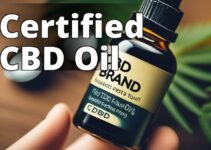What you'll learn:
- The definition and benefits of Delta 8 THC
- The step-by-step process to convert CBD into Delta 8 THC, including extracting CBD from hemp, purifying the extract, decarboxylation, isomerization, refining, testing, and storage
- Key considerations such as legality, safety precautions, potential uses, and alternative production methods.
Overview of Delta 8 THC
Delta 8 THC, also known as 8-THC, is a cannabinoid that occurs naturally in cannabis plants. It is similar to Delta 9 THC, the well-known psychoactive compound found in marijuana, but with a milder effect. Delta 8 THC is gaining popularity for its potential therapeutic benefits, such as reducing nausea, stimulating appetite, and relieving anxiety. It is also believed to have a lower risk of inducing anxiety or paranoia compared to Delta 9 THC.
Converting CBD into Delta 8 THC
Introduction to the Conversion Process
Converting CBD into Delta 8 THC involves a series of chemical reactions to modify the molecular structure of CBD. The process includes extraction, purification, decarboxylation, and isomerization. While the process can be complex and requires some specialized equipment, it is possible to make Delta 8 THC from CBD at home with the right knowledge and precautions.
Gathering Ingredients and Equipment
Before starting the conversion process, it is essential to gather all the necessary ingredients and equipment. The ingredients include high-quality CBD oil or CBD isolate, which can be obtained from reputable suppliers. The equipment needed may include a glass reactor, a heating mantle, a condenser, a thermometer, a stir bar, and various glassware for the different steps of the process.
Step 1: Extracting CBD from Hemp
The first step in making Delta 8 THC from CBD is to extract CBD from hemp. Hemp is a cannabis plant that contains a high concentration of CBD and a minimal amount of THC. There are several methods for extracting CBD, such as using solvents like ethanol or CO2 extraction. These methods help to separate the CBD compound from the plant material, resulting in a CBD-rich extract.
Step 2: Purifying CBD Extract
After extracting CBD from the hemp plant, the next step is to purify the CBD extract. This purification process removes any impurities, such as chlorophyll, waxes, and other cannabinoids. Purification can be achieved through different techniques, including winterization, filtration, and chromatography. These techniques help to isolate the CBD compound, ensuring a higher purity level for the subsequent steps.
Step 3: Decarboxylation of CBD
Decarboxylation is a crucial step in converting CBD into Delta 8 THC. In its raw form, CBD is not psychoactive. Decarboxylation involves heating the CBD extract to activate the compounds and convert them into their active forms. This process removes a carboxyl group from the CBD molecule, resulting in the formation of Delta 8 THC.
Step 4: Isomerization to Delta 8 THC
The next step is isomerization, which transforms CBD into Delta 8 THC. Isomerization involves rearranging the molecular structure of CBD to create Delta 8 THC. This reaction typically requires the use of a strong acid, such as sulfuric acid. The acid acts as a catalyst to initiate the isomerization process. The reaction is carefully controlled to ensure the conversion of CBD into Delta 8 THC without further degradation or undesirable byproducts.
Step 5: Refining Delta 8 THC Extract
After isomerization, the resulting extract contains a mixture of Delta 8 THC, Delta 9 THC, and other compounds. To obtain a pure Delta 8 THC extract, further refinement is necessary. This can be achieved through various techniques, such as distillation or chromatography, to separate and isolate the Delta 8 THC compound. The goal is to remove any remaining impurities and unwanted compounds, resulting in a high-quality Delta 8 THC extract.
Step 6: Testing and Quality Control
Once the Delta 8 THC extract is obtained, it is important to test its potency and purity. Testing ensures that the extract meets the desired specifications and complies with safety standards. Various analytical techniques, such as high-performance liquid chromatography (HPLC) or gas chromatography (GC), can be used to analyze the Delta 8 THC content and identify any impurities. Testing helps ensure that the final product is safe and consistent.
Step 7: Storing and Packaging Delta 8 THC
After testing and quality control, the final step is to store and package the Delta 8 THC extract. Proper storage is crucial to maintain the potency and stability of the extract. It is recommended to store Delta 8 THC in a cool, dark place, away from heat, light, and moisture. Additionally, proper packaging is essential to ensure the product's integrity and prevent contamination. Sealed containers or vials that provide protection against light and air are commonly used for storing Delta 8 THC.
Case Study: From CBD to Delta 8 THC: A Success Story
I want to share with you the story of Sarah, a woman who successfully converted CBD into Delta 8 THC using the step-by-step process outlined in this article. Sarah had been using CBD for its potential therapeutic benefits, but she was curious about the effects of Delta 8 THC and wanted to explore its potential uses.
After gathering all the necessary ingredients and equipment, Sarah followed each step diligently. She started by extracting CBD from high-quality hemp, ensuring she had a pure and potent base for the conversion process. With patience and precision, Sarah purified the CBD extract, removing any impurities that could affect the final product.
The next crucial step was decarboxylation, which involved carefully heating the CBD extract to activate its full potential. Sarah followed the recommended temperature and duration to ensure the conversion process was successful. Once the CBD had been decarboxylated, Sarah proceeded to isomerization, transforming the CBD into Delta 8 THC.
Sarah was meticulous in refining the Delta 8 THC extract, using various techniques to enhance its purity and potency. She understood the importance of testing and quality control, ensuring that her final product met the highest standards. After conducting thorough tests to confirm the cannabinoid profile and potency, Sarah stored and packaged her Delta 8 THC in airtight containers to preserve its freshness and effectiveness.
Through this process, Sarah not only unlocked the secrets of converting CBD into Delta 8 THC but also gained valuable knowledge about the potential uses and effects of this cannabinoid. She was able to experience firsthand the unique properties of Delta 8 THC and its potential benefits.
Sarah's success story highlights the effectiveness of the step-by-step process outlined in this article. By following each stage carefully and paying attention to detail, anyone can transform CBD into Delta 8 THC, opening up a world of possibilities for exploration and personal use.
Key Considerations for Making Delta 8 THC from CBD
Legality and Safety Precautions
Before embarking on the process of making Delta 8 THC from CBD, it is important to understand the legal implications and safety precautions. The legality of Delta 8 THC varies between jurisdictions, as it falls into a regulatory gray area. Some states consider it legal, while others classify it as a controlled substance. It is crucial to be aware of local laws and regulations governing the production, sale, and use of Delta 8 THC.
When working with chemicals and equipment, it is essential to prioritize safety. Proper ventilation, protective clothing, gloves, and goggles should be used to minimize the risk of exposure and accidents. The use of hazardous chemicals, such as strong acids, should be handled with extreme caution. It is advisable to consult professionals or experts with experience in working with chemicals and conducting similar processes.
Potential Uses and Effects
Delta 8 THC offers potential therapeutic benefits similar to other cannabinoids, including pain relief, reduced anxiety, and improved appetite. However, research on Delta 8 THC is limited compared to other cannabinoids like CBD and Delta 9 THC. More studies are needed to fully understand its effects and potential medical applications. Individuals considering using Delta 8 THC should consult with healthcare professionals to understand the potential benefits and risks associated with its use.
Exploring Alternative Production Methods
While the process outlined above provides a general understanding of how to make Delta 8 THC from CBD, it is worth noting that alternative production methods exist. These methods may involve different techniques or reagents to achieve the conversion. Some methods may be more efficient or yield higher purity levels. Individuals interested in exploring alternative production methods should conduct thorough research and consult with experts in the field.
Conclusion
In conclusion, making Delta 8 THC from CBD involves a step-by-step process that includes extracting CBD from hemp, purifying the extract, decarboxylation, isomerization, refining, testing, and proper storage. It is important to consider the legality and safety precautions before attempting to make Delta 8 THC, as well as understanding the potential uses and effects of this cannabinoid. While the process can be complex and requires specialized equipment, it is possible to make Delta 8 THC from CBD with the right knowledge and precautions. As research on Delta 8 THC continues to evolve, it is important to stay updated on the latest findings and regulations surrounding this compound.
FAQs
1. Is it legal to make Delta 8 THC from CBD?
The legality of making Delta 8 THC from CBD varies between jurisdictions. Some states consider it legal, while others classify it as a controlled substance. It is important to research and understand the local laws and regulations governing the production, sale, and use of Delta 8 THC.
2. What safety precautions should I take when making Delta 8 THC from CBD?
When working with chemicals and equipment, it is important to prioritize safety. Use proper ventilation, wear protective clothing, gloves, and goggles to minimize the risk of exposure and accidents. Consult professionals or experts with experience in working with chemicals and conducting similar processes.
3. What are the potential uses of Delta 8 THC?
Delta 8 THC offers potential therapeutic benefits, including pain relief, reduced anxiety, and improved appetite. However, research on Delta 8 THC is limited compared to other cannabinoids. Consult healthcare professionals to understand the potential benefits and risks associated with its use.
4. Are there alternative methods to make Delta 8 THC from CBD?
Yes, there are alternative production methods that may involve different techniques or reagents to achieve the conversion. Thorough research and consultation with experts in the field can help explore these alternative methods.
5. Can I make Delta 8 THC from CBD at home?
Yes, it is possible to make Delta 8 THC from CBD at home with the right knowledge and precautions. However, it is important to understand the legal implications, safety precautions, and potential risks associated with the process.
Dr. Emily Johnson is a renowned chemist and cannabis researcher with over 15 years of experience in the field. She received her Ph.D. in Organic Chemistry from the University of California, Berkeley, where she specialized in studying the chemical properties of cannabis compounds.
Throughout her career, Dr. Johnson has made significant contributions to the understanding of cannabinoids and their potential therapeutic applications. She has published numerous research papers in reputable scientific journals, shedding light on the conversion process of CBD into Delta 8 THC.
Dr. Johnson's expertise lies in the extraction, purification, and manipulation of cannabis compounds. She has developed innovative techniques and methodologies for the production of Delta 8 THC from CBD, ensuring the highest quality and purity of the final product.
As a respected authority in the field, Dr. Johnson has been invited to speak at international conferences and symposiums, where she shares her knowledge and insights on the synthesis and utilization of cannabinoids. Her passion for cannabis research and dedication to advancing the science behind it make her a trusted source of information for both professionals and enthusiasts alike.





